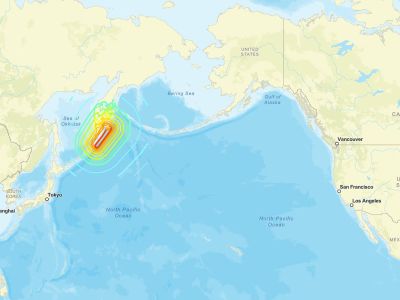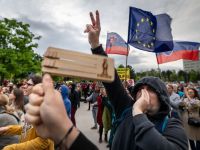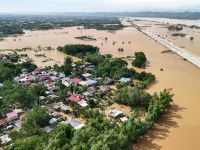Northern Alliance forces entered Kunduz early Sunday, ending a two-week siege of the Taliban's last bastion in northern Afghanistan and leaving only Kandahar and its environs in the hands of the Islamic militia.
The country's acting president, Burhanuddin Rabbani, opened the door for the eventual participation "as individuals" of some Taliban members in a future interim government.
His statement came ahead of a planned conference Tuesday in Bonn of anti-Taliban Afghan groups in the first step toward a broad-based temporary administration for the war-torn country.
Rabbani also pledged that Alliance forces would not "injure or harass" surrendering foreigners -- mostly Pakistanis, Arabs and Chechens linked to Osama bin Laden's al-Qaeda network -- who have been defending Kunduz alongside Afghan Taliban troops.
The Pakistan-based Afghan Islamic Press (AIP) news agency, which has close ties with the Taliban, said troops loyal to ethnic Uzbek Northern Alliance commander Abdul Rashid Dostam took control of Kunduz Sunday after 2,500 of his men moved into the city overnight.
Dostam sent one of his top officers into the commercial and industrial city of 30,000 to start dismantling militia defenses and shipping Taliban and al-Qaeda prisoners west to his headquarters in Mazar-i-Sharif, AIP said.
"The forces of general Abdul Rashid Dostam have entered Kunduz and the Taliban have handed over control of the city," AIP said. "The Taliban have started evacuating Kunduz and its suburbs. They are also handing over military positions one after another to Dostam's forces."
AIP said Dostam now controls 70 percent of Kunduz.
The Uzbek warlord is expected in the city later Sunday and his arrival, AIP warned, would constitute a "headache" for his ethnic Tajik allies who helped surround the city from the east.
Another Alliance commander, Kadam Shah, who operates east of Kunduz, said he was waiting for further surrenders before entering the city from the north.
"The taking of the city should occur in any case Sunday," said the commander of the Khanabad front, about 20 kilometers (12 miles) from Kunduz.
Between 3,000 and 9,000 Taliban troops, up to one third of them foreigners, entrenched themselves in Kunduz after the fall of Mazar-i-Sharif on November 11, resisting a spectacular Alliance blitz across the north, west and center of the country.
Some 700 Afghan and about 600 foreign Taliban fighters surrendered to Alliance forces on Saturday.
Northern Alliance forces in Maidan Shar, near Kabul, the scene of heavy fighting over the past three days, said peace had returned to the region with the formal surrender Sunday of 500 holdouts, who denied however that they had any ties with the Taliban.
Describing the battle as a "local dispute," Hadji Ghulam Mohammad, the Maidan Shar military commander, said only seven of the 500 were detained.
The Alliance said it believed up to 2,000 Taliban holdouts were entrenched in the area when fighting erupted Thursday, but Mohammad said "it was a local problem -- everybody who had a gun came out to fight."
"They wanted to defend their families, they thought they would be killed. It was not because they were supporters of (Taliban leader) Mullah Mohammed Omar," he said. "Now we are together, we want to be at peace."
Rabbani, the UN-recognized president of Afghanistan who was ousted by the Taliban five years ago, told a press conference Sunday that Taliban members who "are not criminals" could take part in a future Afghan administration.
"Taliban authorities and officials can participate in the interim government as individuals, not as the Taliban party, if they are selected through the ... loya jirga," he said.
The loya jirga is a traditional meeting of tribal chiefs, which the United Nations hopes will be convened as a result of Tuesday's conference in Bonn.
Rabbani said the Alliance would send an 11-member delegation -- including one woman -- to Bonn, where a total of 21 participants have been invited.
Most of the US-led anti-terror coalition -- including some components of the Northern Alliance -- are strongly opposed to any Taliban presence in a future Afghan government.
The Northern Alliance is a disparate mix of Uzbek, Tajik, Hazara and other minorities and the Taliban are almost exclusively Pashtun, the largest single community in Afghanistan.
The Alliance has said it is willing to share power with the Pashtun, despite fears that Taliban could easily regroup under a new name, and the grouping's foreign minister Abdullah Abdullah said Friday that there is no such thing as a "moderate Taliban."
"The phrase is a contradiction in terms," he said. "It does not exist."
Rabbani also guaranteed the safety of non-Afghan prisoners of war, saying: "Although they have committed some war crimes in Afghanistan they come under the general amnesty that we have declared and they are pardoned if they put their guns down."
Alliance commanders around Kunduz, however, have said they would be jailed and tried on unspecified charges.
The foreigners, mostly recruited through bin Laden's al-Qaeda network, constituted the hard core of the Taliban's fighting force and were reported to have executed dozens of Afghan militiamen during the siege of Kunduz to prevent their surrender.
Bin Laden, al-Qaeda and their Taliban protectors are blamed by the United States for the terror attacks that claimed some 4,000 lives in New York and Washington on September 11.
In Bangi, 25 kilometers (15 miles) east of Kunduz, large numbers of Taliban fighters could be seen arriving in jeeps to turn themselves in.
Despite fears of reprisals, opposition fighters usually greeted their former foes warmly, cheering them and shaking their hands.
In the south, Taliban forces maintain control of Kandahar and its environs despite advances by local Pashtun leaders, backed by US and British commandos.
Opposition commander Hamid Karzai said Sunday that local tribal forces attacked the Taliban Friday near Takhtapul, some 45 kilometers (30 miles) southeast of Kandahar.
"People rose up against the Taliban and liberated the area," he told AFP via satellite phone. "The Taliban tried to counter attack and retake the area but they couldn't," Karzai.
Karzai also said the road from Kandahar to Pakistan was cut off, but AIP said this was denied by the Taliban -- KABUL (AFP)
© 2001 Al Bawaba (www.albawaba.com)









